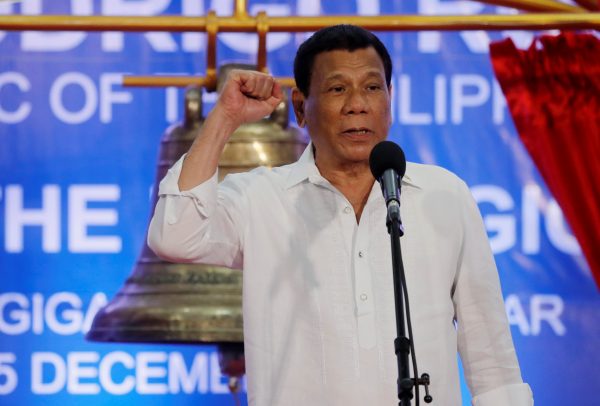Yet while Duterte remains revered in the Philippines for his claimed success in bringing order to the country through his draconian anti-drug campaign, 2018 was not kind to him. His chronic health problems appear to have worsened, although a brief cancer scare proved a false alarm.
Inflation — which hits the poor hardest and is affecting the price of rice and other basic foodstuffs — doubled to nearly 7 per cent in September 2018, easing somewhat by the end of the year. The key drivers of economic growth over the past decade and a half—migrant remittances and call centres—also appear to be sputtering. There are fewer opportunities to work abroad while advances in artificial intelligence make business process outsourcing less labour intensive.
Succession poses a real danger to Duterte’s inner circle. Vice President Maria Leonor ‘Leni’ Robredo is a member of the opposition Liberal Party. (In an electoral quirk, the vice president is elected separately in the Philippines.) Presently, though, she faces a vote count challenge to the 2016 vice-presidency election results from Ferdinand ‘Bongbong’ Marcos, son of the former Filipino dictator Ferdinand Marcos, which could soon unseat her.
Meanwhile, Duterte’s allies squabbled among themselves, with discredited former president Gloria Macapagal Arroyo making a comeback as speaker of the House and ousting another Duterte ally with the apparent backing of his daughter Sara Duterte-Carpio. The manoeuvring was caught on national television, delaying and upstaging Duterte’s third state of the nation address in July 2018. The infighting carried over into candidate selection for the May 2019 mid-term elections, with Duterte’s supposed ruling PDP–Laban party fearing marginalisation from Sara Duterte’s Hugpong ng Pagbabago (HNP) party composed of regional barons. Duterte himself is yet to confirm his favoured slate of candidates.
Peace talks with communist insurgents have broken down and cabinet members linked to the movement have been forced out of the cabinet, with the far left now among the most outspoken opponents of the President. Despite calling himself a ‘socialist’, Duterte is doing too little to address the Philippines’ high rates of poverty.
Duterte has raised senior citizen pensions, provided medical care to the homeless and increased police and soldiers’ salaries. But he has not sufficiently addressed rural poverty — the most persistent in Southeast Asia despite 15 years of high growth — nor ended unfair short-term labour contracting after promising to do so. His major populist gestures, particularly abolishing tuition at state-run universities, are middle-class subsidies in disguise — only 12 per cent of students are poor.
While Duterte brushes aside institutional checks — with the lower house controlled by his allies and the courts seemingly cowed after the dubious removal of the sitting chief justice in May 2018 — he is attacking his critics more blatantly. As part of mounting efforts to intimidate the press, questionable tax charges have been brought against CEO Maria Ressa of online newspaper Rappler, who claims she is being persecuted for hard hitting reporting on the drug war.
Duterte’s efforts to draft a new federal constitution are meeting strong resistance, with some cabinet officials criticising provisions of a new charter draft as too expensive. The political reforms designed to keep the country from descending into ‘dynastic federalism’ proposed by the constitutional consultative committee, particularly a ban on political clans, were quickly cast aside in a revised version masterminded by Arroyo and her allies in the House of Representatives. But the Senate refused to take up consideration of the revised draft in October 2018 due to supposed time constraints.
The Senate has been the only major institutional bastion of opposition to Duterte. Even though pro-Duterte candidates are likely to dominate the May 2019 elections, a number of oppositionists will remain in the Senate and will likely be joined by defeated presidential candidate, and close ally of former president Benigno Aquino III, Manuel ‘Mar’ Roxas, who has joined the Senate race and seems likely to be among the winners.
Lost amid Duterte’s continuous Trump-like provocations, which dominate domestic and international media coverage of the Philippines, is a piece of good news. In August 2018 Duterte signed the Bangsamoro Organic Law after failed attempts by previous administrations. This achievement gives the country’s Muslims autonomy in parts of Mindanao and offers the prospect of lasting peace after nearly five decades of on-and-off war. A referendum on greater autonomy in the predominantly Muslim areas of Mindanao is ongoing with initial results suggesting it will pass overwhelmingly.
After going through an ‘acclamatory phase’ in which the police publicised deaths in the drug war as an indication of success, the Duterte administration is now on the defensive. Three policemen were convicted in late 2018 of the killing of an unarmed teenager in 2017, the first such conviction since Duterte came to office.
Yet the killings continue unabated. International press seem to have lost interest in the ‘war on drugs’ and recent official Philippine National Police data of nearly 5000 killed, or six daily, suggests the campaign is becoming ‘less bloody’. But the real count has been obfuscated. Given the suspiciously high number of unsolved homicides, the more reasonable estimate may be that of the Chairperson of the Commission on Human Rights: 27,000 drug war victims, or an average of nearly 1000 extra-judicial killings monthly since Duterte took power.
While Duterte remains popular for the moment, his worsening health, infighting among his allies and persecution of his enemies as criticism of his war on drugs mounts is putting his legacy in serious doubt.
Mark R Thompson is Head and Professor of Politics in the Department of Asian and International Studies and Director of the Southeast Asia Research Centre at the City University of Hong Kong.
This article is part of an EAF special feature series on 2018 in review and the year ahead.

